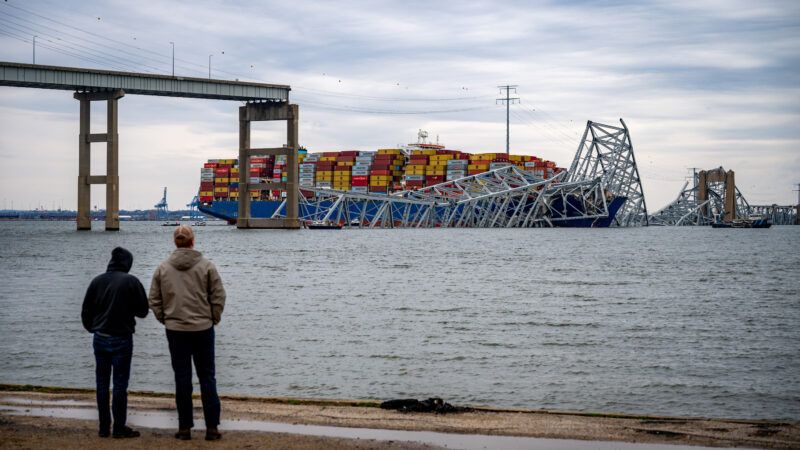Taxpayers Outside Maryland Shouldn't Pay To Rebuild a Toll Bridge Inside Maryland
Part of the 1,500-page spending bill Congress is expected to pass this week would obligate federal taxpayers to fund the Key Bridge replacement.

Federal taxpayers will cover the full cost of rebuilding Baltimore's Francis Scott Key Bridge if Congress approves a major spending bill this week.
The toll bridge, which carried Interstate 695 across the entrance to Baltimore's harbor, was destroyed in March when a container ship collided with one of its supports. Rebuilding the bridge will cost an estimated $1.9 billion.*
Funding for the bridge is included in the 1,500-page stopgap spending bill that will avert a government shutdown and keep federal programs running until March. The package is expected to pass before the end of the week.
Maryland lawmakers and other public officials had been lobbying heavily for the federal government to pick up the tab for a new bridge. In a joint statement issued on Tuesday, Sens. Ben Cardin (D–Md.) and Chris Van Hollen (D–Md.) said the federal funds will allow the bridge "to be built as quickly as possible"
They also promised that federal taxpayers would be "reimbursed through proceeds from insurance payments and litigation" against the company that owns the ship that collided with the bridge.
Hopefully, that works out, but it would have been better not to ask federal taxpayers—many of whom will never use the bridge—to pay for this in the first place.
As noted above, the old Key Bridge was a toll bridge, and the replacement is likely to be tolled as well. Indeed, Maryland officials have been complaining about how the loss of toll revenue from the bridge has affected other projects in the state.
That should raise an obvious question: Why can't the future toll revenue from the Key Bridge pay for the rebuilding of the Key Bridge?
"Those tolls were paid by Key Bridge users presumably for the capital and operating costs of that bridge," wrote Robert Poole, director of transportation policy for the Reason Foundation (the nonprofit that funds this publication) in September. "Using tolls to finance some or all of the $1.9 billion cost of the replacement bridge would continue the users-pay/users-benefit principle."
As Poole also noted, Congress authorized the use of tolls to pay for bridge replacement projects on Interstate highways in 1991, and several such projects have been completed—for example, the new Calcasieu River bridge on Interstate 10 in Louisiana.
Officials could also have considered letting a private company rebuild the Key Bridge and collect tolls to cover the project's cost. It may have been necessary to use some state or federal funds to underwrite the cost or keep tolls at the same level as were charged on the old bridge, but at least taxpayers would have been asked to cover only a portion of the full cost.
At the very least, Congress could have cut some other part of the federal budget to offset the $1.9 billion for the Key Bridge.* Budgeting is, after all, mostly an exercise in setting priorities. If this rates as a priority, something else must be less important.
Congress seemingly lacks the ability to understand that such trade-offs are essential to effective budgeting. Instead, all taxpayers will be obligated to pay for the full rebuilding cost on top of everything else the government is doing.
The Key Bridge project is just one small part of an emergency spending bill that will add an estimated $300 billion to the budget deficit over 10 years. Still, it is a useful illustration of why the federal government runs such massive deficits every year. Even when given the opportunity to choose more cost-effective ways of accomplishing important goals—like quickly rebuilding a vital bit of transportation infrastructure—Congress is unable to fight the urge to spend recklessly.
*CORRECTION: An earlier version of this article incorrectly stated the cost of the bridge.


Show Comments (56)